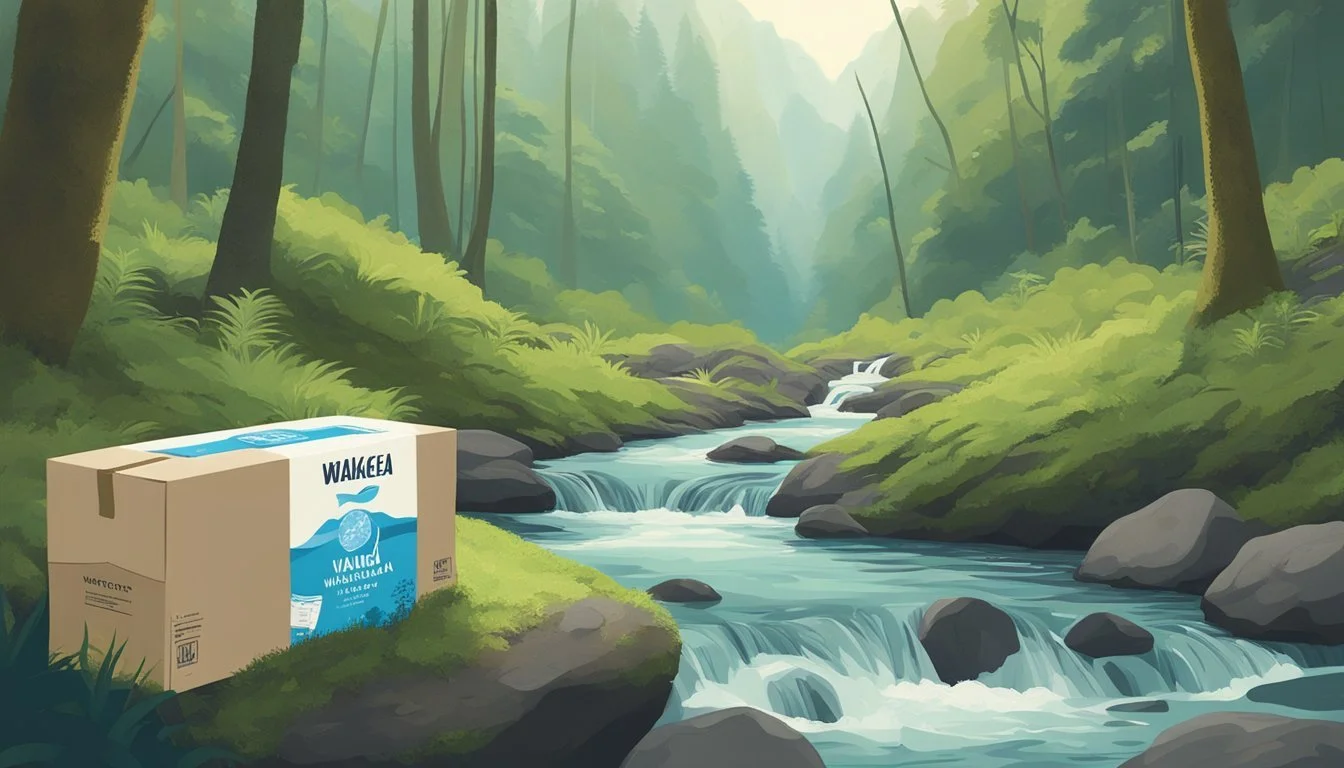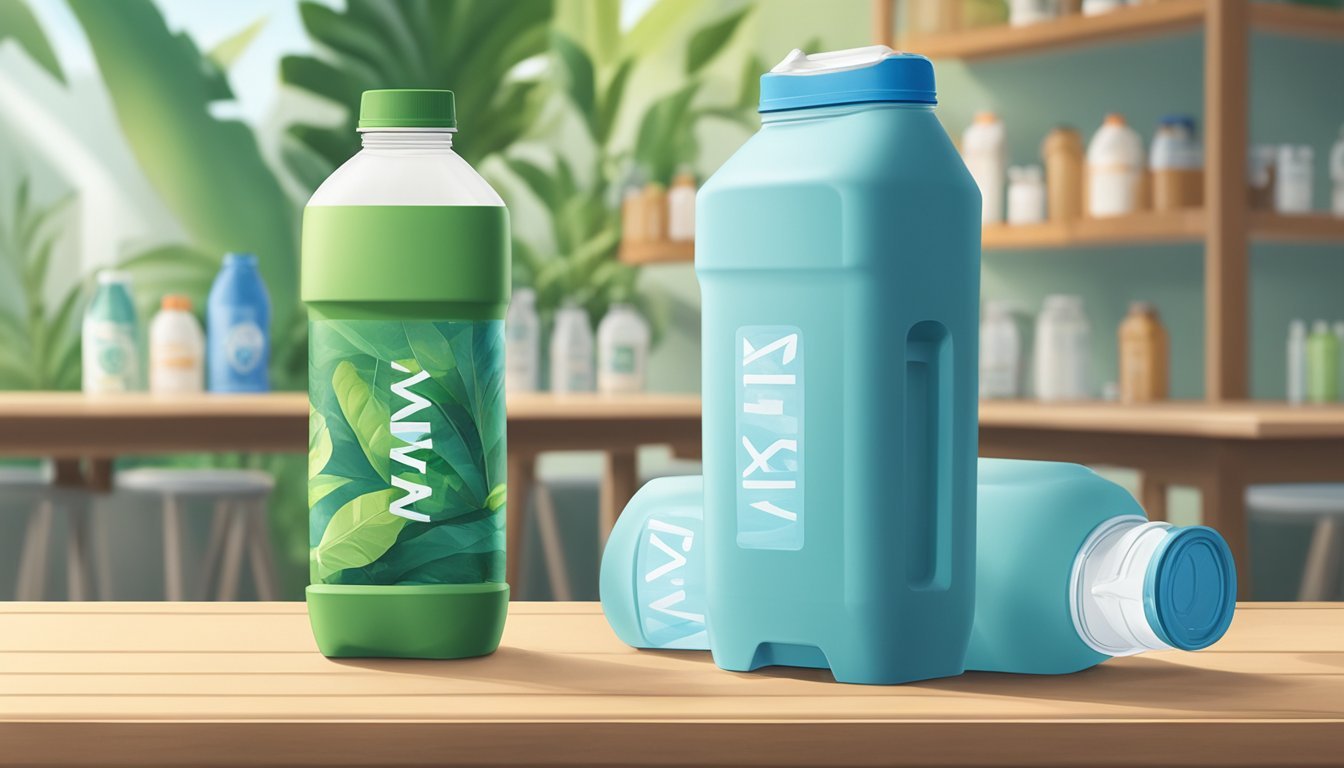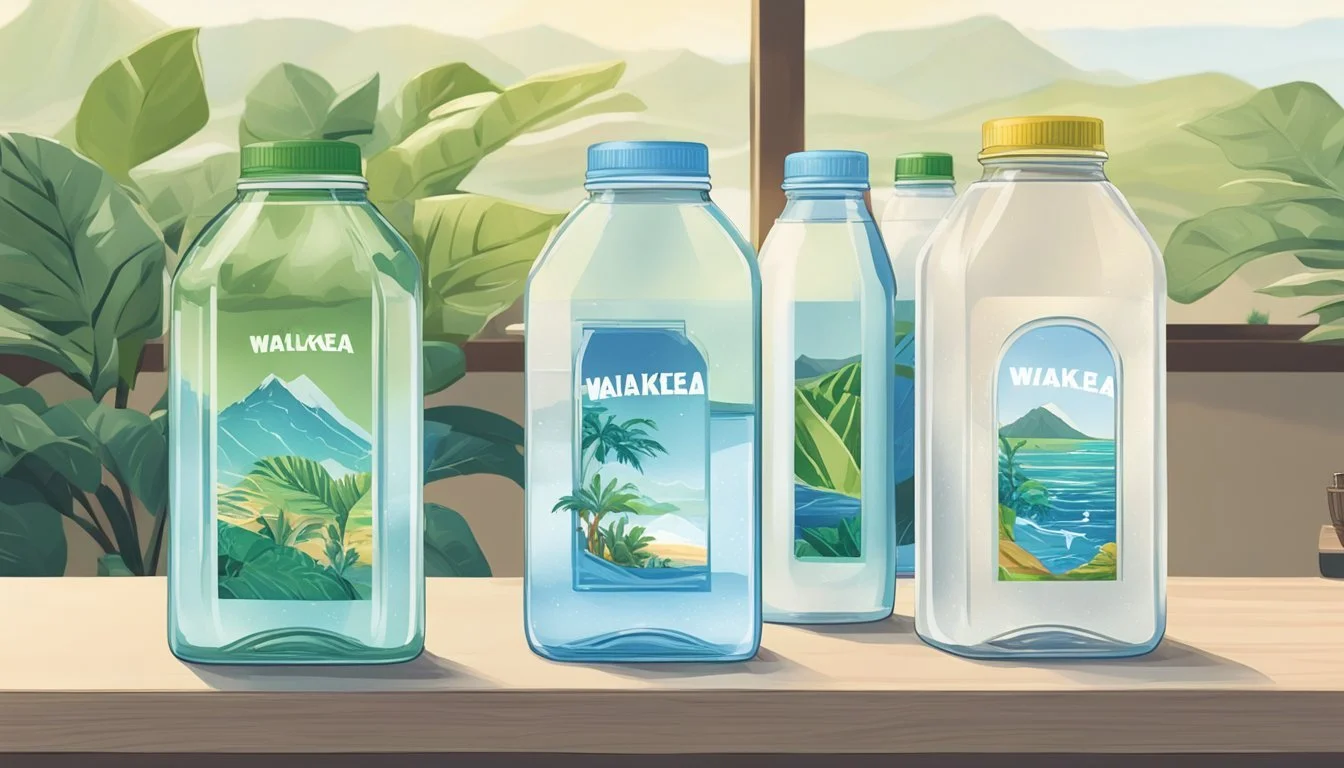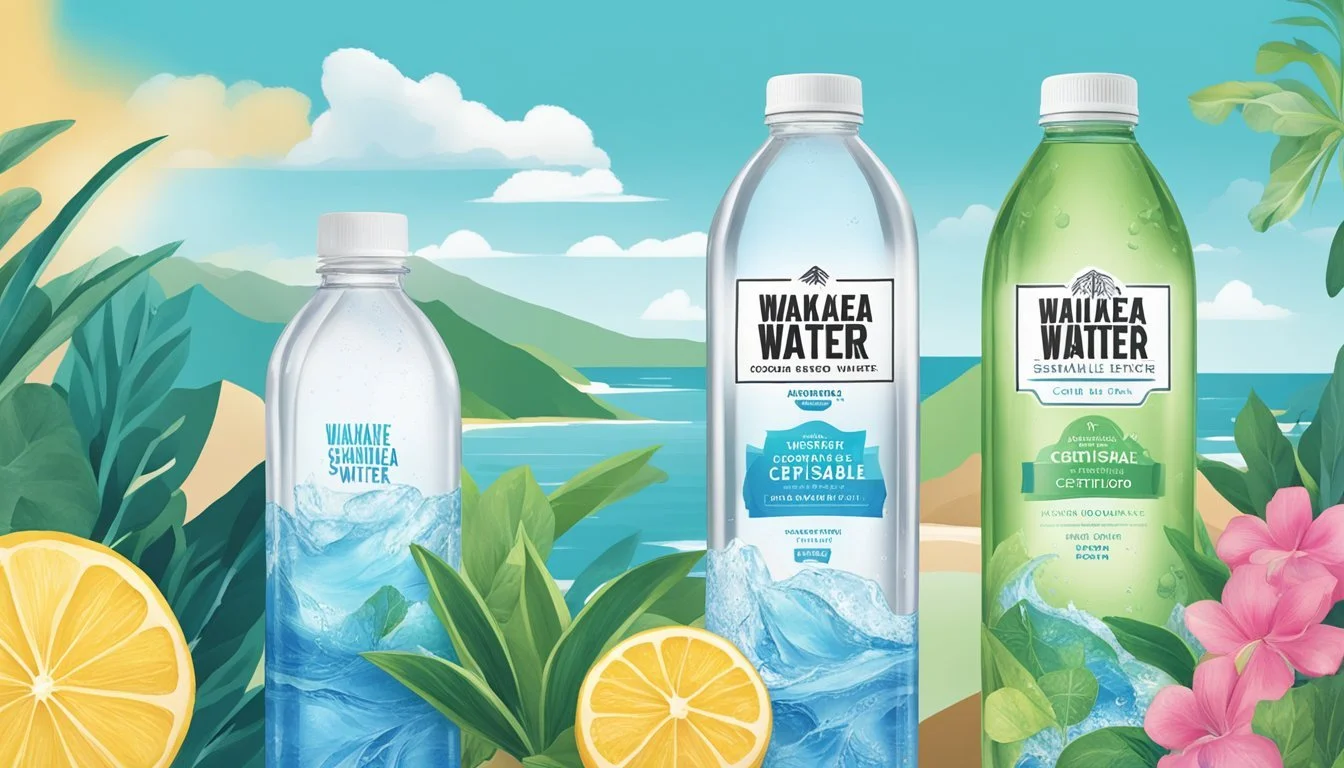Boxed Water vs. Waiakea
Which Bottled Water is Better for You?
When it comes to choosing between Boxed Water and Waiakea, several factors including taste, sustainability, and sourcing play crucial roles. Boxed Water Is Better offers a crisp, neutral flavor that's particularly refreshing, packaged in a unique milk box-style carton that's both fun and functional. This water is a conscious choice for those looking to reduce plastic waste, as its packaging is a mix of sustainable paper, aluminum, and plastic film designed to be eco-friendly.
On the other hand, Waiakea water is sustainably sourced directly from the Waiakea springs at the base of Mauna Loa in Hawaii. This volcanic water not only has a unique mineral composition but is also bottled in a facility running on 100% renewable energy. Waiakea sets a high standard for bottled water by being the first to be certified Carbon Neutral and donating over 5% of revenue to nonprofits.
Both brands have their strengths: Boxed Water prioritizes innovative packaging to tackle plastic pollution, while Waiakea focuses on sustainability and social responsibility from source to shelf. This comparison delves into which bottled water might best fit your lifestyle and values.
The Emergence of Boxed and Waiakea Waters
Boxed Water and Waiakea Water have both positioned themselves as innovative, environmentally conscious bottled water brands. Their histories highlight their commitment to sustainability and health.
History of Boxed Water
Boxed Water was founded in 2009 with the aim of creating a more sustainable alternative to plastic and aluminum bottled water. Its water is purified using methods like reverse osmosis, carbon filtration, and ultraviolet light. The packaging, made primarily from paper, comes from sustainably harvested trees.
Boxed Water focuses on reducing its environmental impact. Studies cited by the company claim that their water cartons have a lower environmental footprint compared to traditional plastic bottles. The distinctive milk carton-style packaging not only makes it stand out on shelves but also underscores its eco-friendly mission. Boxed Water started a trend that other companies have begun to follow, emphasizing the importance of sustainable packaging in the bottled water industry.
History of Waiakea Water
Waiakea Water was established in 2012 and is sourced from the Mauna Loa volcano in Hawaii. The water is naturally filtered through volcanic rock, which is said to enrich it with minerals and electrolytes. This unique filtration process contributes to its distinct taste and health benefits.
Waiakea Water also emphasizes sustainability. Its bottles are made from 100% recycled polyethylene terephthalate (rPET), and the company claims its production process is carbon neutral. In addition to its focus on packaging, Waiakea Water supports access to clean water in developing communities through various charitable initiatives.
Waiakea Water's combination of health benefits and sustainable practices has helped it garner a loyal customer base. It aims to make a positive impact on both the environment and the well-being of its consumers.
Source and Natural Composition
Boxed Water and Waiakea differ significantly in their sources and natural compositions, which influence their taste and perceived health benefits.
Boxed Water Sources
Boxed Water is typically sourced from multiple locations to ensure sustainability and high quality. It often comes from municipal sources that meet rigorous purification standards. After sourcing, the water undergoes a multi-step purification process that includes reverse osmosis, carbon filtering, and UV treatment.
PH Level: Boxed Water has a neutral pH, closely resembling that of pure water (around 7).
Mineral Content: Due to its extensive filtration, Boxed Water has a minimal mineral content. The process removes most natural minerals, resulting in a relatively bland taste compared to spring or mineral waters.
The packaging also sets Boxed Water apart, focusing on eco-friendliness. It uses 92% plant-based materials and aims to reduce plastic waste.
Waiakea Water Source
Waiakea Water is sourced from the volcanic regions of Hawaii. This water is naturally filtered through porous volcanic rock, which enriches it with minerals.
PH Level: Waiakea Water is naturally alkaline, with a pH of around 8.2, making it less acidic than most bottled waters.
Mineral Content: As the water travels through volcanic rock, it gathers beneficial minerals such as silica, calcium, and magnesium. These minerals contribute to health benefits like improved bone, hair, skin, nail, and heart health.
Waiakea's unique filtration process and mineral content offer a refreshing taste and a distinct identity. Additionally, Waiakea is known for its commitment to sustainability, being the first U.S. bottled water certified Carbon Neutral and donating 5% of its revenue to nonprofits.
Packaging and Environmental Footprint
The packaging and environmental footprint of Boxed Water and Waiakea are essential components in determining which brand is more sustainable. Key factors include the materials used and each company's environmental initiatives.
Materials and Recyclability
Boxed Water uses packaging made mainly of paper sourced from FSC-certified forests, incorporating 92% plant-based content. The remaining components are plant-based plastic derived from sugarcane and a small amount of aluminum. This design makes Boxed Water highly recyclable in areas with carton recycling facilities.
Waiakea, on the other hand, utilizes 100% RPET (recycled polyethylene terephthalate) bottles. These bottles are made from previously recycled plastic, significantly reducing the need for new plastic production. RPET is recyclable, but proper recycling infrastructure is critical for reprocessing these materials into new products.
The recyclability of both products depends heavily on local recycling capabilities. Boxed Water's cartons require specialized facilities, whereas Waiakea’s RPET bottles are more widely accepted in standard plastic recycling streams.
Environmental Initiatives
Boxed Water emphasizes reducing its carbon footprint by using renewable resources and maintaining a lower impact than traditional plastic bottles. The company has partnered with organizations like the National Forest Foundation to plant trees, aiming to offset carbon emissions and support reforestation efforts.
Waiakea focuses on sustainability through its carbon-neutral certification, achieved via reforestation projects and responsibly sourced water. It supports the Hawaiian community by donating a portion of profits and providing clean water to those in need through numerous programs.
Both brands show commitment to being eco-friendly, but their approaches differ. Boxed Water leans towards innovative packaging materials and significant reforestation efforts. In contrast, Waiakea prioritizes recycling, carbon neutrality, and community support, underscoring their unique strategies in reducing environmental impact.
Health and Hydration Benefits
Both Boxed Water and Waiakea offer distinct health and hydration benefits. Understanding these differences will help consumers make an informed choice about which might be better for their specific needs.
Hydration and Electrolytes
Waiakea water has a naturally high alkaline pH of 8.8, which helps neutralize acidity within the body. This can be beneficial for individuals with acidic diets.
Additionally, Waiakea provides essential minerals such as calcium, magnesium, and silica. These minerals improve hydration and support various bodily functions, including muscle function and bone health.
Boxed Water, while purified for safety, doesn’t emphasize naturally occurring minerals. It typically undergoes a reverse osmosis filtration process, which removes impurities. Although safe and clean, this process also strips the water of its natural minerals, making it less hydrating compared to naturally alkaline water like Waiakea.
Key Points:
Waiakea: High in pH and minerals, beneficial for hydration.
Boxed Water: Purified through reverse osmosis, lacking natural minerals.
Contaminant Filtration
Boxed Water undergoes rigorous filtration to ensure it meets EPA standards for contaminant levels. This filtration includes the removal of harmful substances like lead, fluoride, arsenic, and mercury.
Waiakea relies on its natural volcanic filtration, claiming to naturally filter out many contaminants. While it provides the recommended daily value of silica, its natural filter may not be as comprehensive in removing all potential contaminants.
Consumers looking for water with rigorous contaminant removal may find Boxed Water's process more reassuring. Conversely, those seeking additional minerals might prefer Waiakea despite the less controlled filtration.
Key Points:
Boxed Water: Comprehensive filtration, removes contaminants.
Waiakea: Natural filtration, retains beneficial minerals.
By comparing both waters, individuals can prioritize what health benefits matter most to them, whether it's thorough filtration or natural minerals.
Taste and Drinking Experience
Boxed Water and Waiakea offer distinct taste and drinking experiences shaped by their source and composition. This section examines their flavor profiles and consumer preferences.
Flavor Profile Comparison
Boxed Water is known for its crisp and refreshing taste. It provides a neutral flavor, appealing to those who prefer simplicity. The water is sourced and filtered to ensure purity, removing any impurities that could alter its flavor.
Waiakea, on the other hand, is an alkaline water with a pH of 8.2, offering a smooth and slightly sweet taste. It is sourced from volcanic rock in Hawaii, infusing it with minerals like calcium, magnesium, and potassium. These minerals not only contribute to Waiakea’s taste but also provide health benefits.
Consumers often note that while Boxed Water is clean and straightforward, Waiakea has a distinct mineral-rich flavor that sets it apart. This can be a deciding factor for those who prefer an enhanced drinking experience.
Consumer Taste Preferences
Consumer preferences vary when it comes to Boxed Water and Waiakea. Many appreciate Boxed Water's neutral taste, as it easily complements meals and is less likely to impact the palate. This makes it a versatile choice for daily hydration.
In contrast, Waiakea's alkaline and mineral-rich composition appeals to those looking for more than just hydration. The unique flavor and potential health benefits make it a favorite among enthusiasts of premium bottled waters.
Taste tests show a split in preference. Some consumers prefer the uncomplicated profile of Boxed Water, while others are drawn to Waiakea's distinctive taste. This divide highlights the importance of personal tastes and dietary considerations in choosing bottled water.
Sustainable Practices and Certifications
Waiakea and Boxed Water both prioritize environmental sustainability, incorporating various practices and gaining key certifications to support their eco-friendly claims.
Sustainability Commitments
Waiakea uses high-grade 100% rPET (recycled post-consumer polyethylene terephthalate) for their bottles. This practice reduces energy consumption by 85%, water use by 99%, and carbon emissions by 79% compared to traditional virgin plastics. They were the first U.S. bottled water to achieve Carbon Neutral certification and donate over 5% of their revenue to global and local nonprofits.
Boxed Water focuses on using 92% renewable packaging made of FSC-certified paper, a small amount of bio-plastic, and aluminum. They emphasize reducing plastic waste and are committed to planting trees to offset their carbon footprint. Additionally, their purification process includes ultraviolet light, carbon filtration, and reverse osmosis to ensure water purity and safety.
Certifications and Standards
Waiakea’s dedication to sustainable practices is evident through several key certifications. They have been certified Carbon Neutral, acknowledging their efforts in minimizing carbon emissions. They also utilize Life Cycle Assessment (LCA) to continuously improve and measure the environmental impact of their products.
Boxed Water has certification from the Forest Stewardship Council (FSC) for their paper-based cartons. This certifies that the paper used comes from responsibly managed forests. Their innovative packaging design also includes a mix of aluminum and plant-based bio-plastic, ensuring durability while maintaining eco-friendliness. Their efforts support broader sustainability goals, including reducing oil dependency and promoting renewables.
Market Presence and Availability
Boxed Water and Waiakea exhibit distinct market presence and availability, as illustrated through their distribution channels and varying levels of accessibility in both physical retail and online platforms.
Distribution Channels
Boxed Water demonstrates significant distribution through both traditional retail outlets and innovative partnerships. Boxed Water can be found prominently in health-focused stores like Whole Foods and specialty shops across various states. They also collaborate with airlines such as Alaska Airlines, making it convenient for travelers.
Waiakea emphasizes a more eco-friendly presence, often targeting stores that prioritize sustainability. Additionally, Waiakea is popular in natural food markets and some conventional supermarket chains, ensuring a wide but selective reach.
Retail and Online Accessibility
Boxed Water is easily accessible in numerous physical retail locations across the United States. This includes various supermarket chains, health food stores, and pharmacies. Online, Boxed Water is widely available through major e-commerce platforms such as Amazon, making it convenient for a broad customer base to purchase from anywhere.
Waiakea offers significant online access through its own website and other e-commerce giants like Amazon. This ensures that customers from different locales can easily obtain their products. In retail, Waiakea is seen in specialty stores, emphasizing sustainability and premium quality, which mirrors its brand ethos.
Consumer Trends and Preferences
Consumers are increasingly focusing on sustainability and product reviews when choosing between Boxed Water and Waiakea. They prioritize eco-friendly packaging and the public opinion of each brand.
Shift towards Eco-Friendly Options
There has been a noticeable shift towards eco-friendly alternatives in the bottled water market. Consumers are rejecting plastic bottles in favor of more sustainable options. Boxed Water, for example, offers packaging that is 92% plant-based. This high percentage of renewable content appeals to those who are environmentally conscious.
Waiakea has also made strides in sustainability by being the first U.S. bottled water to be certified Carbon Neutral. They emphasize both people and the planet. Consumers often look for brands that donate to causes, and Waiakea's commitment to donating over 5% of revenue to nonprofits resonates well.
Public Perception and Reviews
Public perception and reviews significantly influence consumer choices. Boxed Water's eco-friendly packaging has received positive feedback from consumers seeking alternative options to traditional bottled water. Reviews praise the brand for its innovative approach and commitment to the environment.
Waiakea is well-regarded for its Hawaiian volcanic water and its social responsibility efforts. Consumers often commend Waiakea's clean taste and philanthropic initiatives. Additionally, the fact that they help combat issues such as the water crisis boosts their brand image.
Consumer reviews frequently mention the importance of reusable water bottles and the availability of water on the go. With concerns about greenwashing, buyers are more scrutinizing and prefer transparency. Both Boxed Water and Waiakea have managed to maintain strong reputations by being clear about their environmental efforts.
Comparative Analysis
This analysis examines Boxed Water and Waiakea on their unique qualities and places them in the broader context of the competitive bottled water market.
Direct Comparison of Boxed Water and Waiakea
Boxed Water stands out with its eco-friendly packaging, primarily made from 74% paper, 25% plastic, and 1% aluminum. The packaging's design appeals through sustainability, featuring a milk box-style that is both distinctive and functional.
Waiakea is known for its volcanic water source in Hawaii, offering natural alkalinity with a pH of ~8.2. Waiakea also emphasizes sustainability, being the first U.S. bottled water certified Carbon Neutral and donating over 5% of its revenue to nonprofits.
In terms of taste, Boxed Water is praised for its crispness, while Waiakea provides a clean and naturally alkaline flavor. Both brands stress environmental stewardship but differ in their specific approaches and source of water.
Competitive Landscape
The bottled water market is highly competitive, with brands vying for consumer preference through unique features. Boxed Water competes with other eco-friendly options like Just Water and Flow, focusing on green packaging.
Waiakea positions itself against premium brands such as Fiji, Evian, and Voss, emphasizing its volcanic origin and eco-conscious practices.
Major players including Coca-Cola's Dasani and PepsiCo's Aquafina control substantial market shares. Despite this, niche brands like Waiakea and Boxed Water carve out their space with unique selling points, targeting environmentally aware consumers.
This dynamic market continually evolves, with brands like Smartwater, Pure Life, and Essentia offering various health and wellness benefits, thus increasing the choices available to consumers.
Future Outlook and Innovations
Innovations in the bottled water industry emphasize sustainability and reducing environmental impact. Key advancements include alternatives to single-use plastic bottles and improved packaging materials.
Emerging Trends in Bottled Water
Packaged water is moving towards eco-friendlier options. Many brands are exploring canned water and glass bottles to minimize plastic use.
Boxed Water highlights their 92% plant-based packaging, showcasing a commitment to renewability. Data indicates a shift toward aluminum and glass, both of which offer recyclable options with less environmental footprint. Consumers' awareness of sustainability drives these changes, pushing more companies to innovate.
Innovations in Sustainable Packaging
Boxed Water uses cartons made from 74% paper, which includes plastic film and a small amount of aluminum to maintain water integrity. This approach aims to reduce the reliance on single-use plastic bottles.
In contrast, Waiakea's eco-friendly practices are evident in their Carbon Neutral certification. They emphasize alternatives like recycled plastic (rPET) and biodegradable materials, setting a benchmark for the industry. Both brands' efforts illustrate a future where sustainable packaging is the norm, not the exception.







